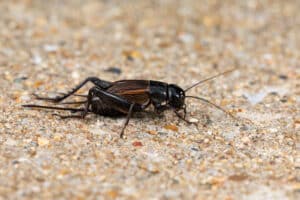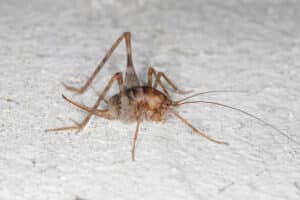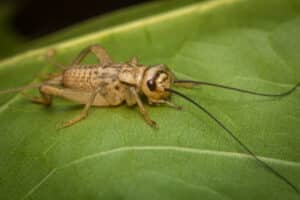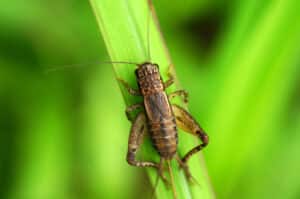
Annoying Chirps Inside the House? Find Out How to Get Rid of Crickets
May 19, 2023
By Daniel Baldwin, BCE, CCFS, CP-FS
When crickets get into your home, their loud chirping noises instantly become a nuisance. However, aside from their disturbing sounds, crickets can also damage different types of fabric around the house, including clothing made of cotton and silk. Keep reading to learn more about why these pests come into your home, what they eat, and how to get rid of crickets.
What attracts crickets to your home?
Crickets tend to stay outside, but they may find their way into your home in search of the warmth in your home. They may come inside houses and other structures when the weather starts to cool; they prefer kitchens, bathrooms, and any rooms with a fireplace or heater.
What do crickets eat?
Crickets prefer stems and seeds of all types. Crickets can also feed on aphids. When inside your home, crickets can eat clothing, furniture, and draperies. They can also eat plastic bags and cardboard to get into foods like cereal and grains.
Other items and food scraps in your home crickets might forage for include:
- Raw vegetables, especially carrots, lettuce, cabbage, and potatoes
- Fruits that contain vitamin C, fiber, or potassium, such as oranges, bananas, and apples
- Cat and dog food
A cricket also eats other insects and their larvae and may even eat other crickets if nothing else is available.
How to get rid of crickets
Although a pest control service is the best way to get rid of crickets in the house, there are some ways to deal with them if you discover a cricket nest inside:
- Seal all points of entry to your home, including cracks and holes in the foundation, rips in window screens, and gaps in doorways.
- Reduce areas of moisture and humidity around your home. Fix leaky pipes, and place a dehumidifier in the basement.
- Don’t leave outdoor lights on all night near entries to your home—use sensor-activating fixtures instead.
- Vacuum areas where you suspect crickets may be nesting, as you may be able to remove their tiny eggs.
Cricket FAQ
Crickets are of the family Gryllidae, a species of leaping insects of the order Orthoptera. Three types of cricket typically come inside homes when the weather cools: field, camel, and house crickets. They all measure up to ¾” long.
Field crickets
Field crickets are dark brown or black with rounded wings. They’re attracted to light and, when indoors, feed on materials made of cotton, linen, silk, or wool, especially if these fabrics are stained with food or sweat.

Camel crickets
Camel crickets, also known as cave crickets, are tan-colored and a humped back with no wings. They aren’t attracted to light. You’ll find these crickets in basements because they’re drawn to damp, dark environments. They sometimes eat paper products.

House crickets
House crickets are yellow-brown in color and have three dark bands on the backs of their head. Their wings are long and pointed. These crickets are attracted to light and feed on fabrics, sometimes causing extensive damage if an infestation becomes large enough. They’re often purchased to feed certain pets, such as reptiles, birds, or amphibians and can escape before your pet gets a hold of them.

How long do crickets live?
The lifespan of a cricket is typically 60-90 days. Female crickets need to lay eggs in autumn that hatch when winter is over.
Why do crickets chirp?
Male crickets make chirping sounds mainly to attract females for reproductive purposes. Chirps can also be a call to fight or repel other male crickets away from the desired female. Crickets make their loud, distinctive chirping noises by rubbing the ends of their forewings together.
Do crickets fly?
Some species of crickets can fly, while others can’t. The house cricket is capable of flying but typically prefers to crawl. Field crickets only fly when very large numbers are grouped together. Camel crickets have no wings, so they can’t fly. They also can’t chirp.
Pest control services
Aside from their chirping sounds disturbing your rest, crickets can cause destruction in your home, feeding on fabrics, food, and other common items. The best way to get rid of an infestation is with professional help. Our expert technicians use specific tools and technologies to treat infestations and provide professional advice on preventing pests from returning to your home. Contact the professionals at Hawx Pest Control today for a free estimate.
Categories
RELATED POSTS



